Advertisement
Mass. Law On ICU Nurse Staffing Ratios Has Had Little Effect Since 2016, Study Finds

A new study concludes that state-mandated nurse staffing ratios for intensive-care patients have had little effect on mortality or complications.
Beth Israel Deaconess Medical Center researchers wanted to see if a law that required one nurse for every one or two ICU patients resulted in any improvements.
Lead author Dr. Anica Law says the report also found very little impact on the number of nurses on the job. "We didn't find either a strong impact on nurse staffing or on patient outcomes, mortality or complications," she says.
The study did find a slight increase in staffing but that rise was mirrored in the rest of the country and so could not be attributed to the law, which passed in 2014 but required hospital compliance only as of the spring of 2016.
A state ballot question this November will ask whether to set nurse-to-patient ratios in all hospital units and would take effect Jan 1.
Law cautions that the new study cannot be extrapolated onto the upcoming ballot question for several reasons, particularly because the ballot initiative may lead to bigger staffing changes than the ICU law did.
ICU staffing before the law was generally adequate, she says, and so the law didn't change much for nurses or patients. "However, the ballot initiative may be very different. What we don't even know now, and what we need more data on, is what the current state of staffing is outside the ICU," she says.
There may be much more variability on regular hospital floors than in the ICU, Law says, so the ballot initiative's effects on staffing could be greater.
It is very difficult for research to isolate the effect of nurse staffing levels on patient outcomes, she says, because hospitals with better nurse staffing tend to be of higher quality in other ways as well. So looking at Massachusetts ICUs before and after the mandated ratios kicked in, and comparing them to the rest of the country, offered a special opportunity to try to pinpoint staffing effects, she says.
"I would just give the caveat that our study is on the effect of the law and not the effect of nurse staffing," she adds. "Everyone knows that nurse staffing is critical to the care and outcomes of our patients. And so it's not to say that we can draw any conclusions about what would happen with higher or lower nurse staffing. All we can say is that with the passage of the mandate in Massachusetts, we didn't find either a strong impact on nurse staffing or on patient outcomes — mortality and complications."